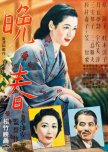Delicate Spring makes way for powerful Summer
What's remarkable about this film is that it appears completely unremarkable. The pace is slow, there's no action, the characters look lethargic, and the dialogue and cinematography involve us with mundane matters and scenes; the music is painstakingly slow - even a tune we all know well, "Wedding March", is slow and somber; there is virtually no excitement; even the trains move slow. It is remarkable how this film kept me emotionally and intellectually engaged for ~2 hours and prompted ample reflection after the film ended.
Since this film is a part of the classic film canon, you can easily look up professional critics' and filmmakers' commentary. Consider that so many have put this film in their top 100 films of all time list; that's not an easy list to make! However, I'll share a few thoughts on how I connected with the film.
Consider the title, "Late Spring". The film was inspired by the short story, "Father and Daughter", by Kazuo Hirotsu. The short story title is directly related to the film's characters and plot; we don't get many explicit clues that the story takes place during Spring, so the film title is more evocative than descriptive. So, why not call the film, "Father and Daughter"? I don't know the reasons the filmmakers chose "Late Spring" as the title, but its suggestion to think about the film metaphorically is quite effective.
Noriko and her father, Somiya, are delicate souls, and their relationship with one another is tender in love to an extreme. After father is told by daughter "no play until work is done", the father's impatient response of "go bring the tea" is the comical peak of his anger (if only tiger parents could study this scene). The impending transition of their relationship status from live-in daughter/dad to no longer living with one another signals a change in their 'season' as a family. Daughter and father were happily living in a delicate Spring. With Noriko's upcoming marriage, they quickly move to Summer.
Consider Spring, as a social metaphor, representing individuals' inner thoughts and desires. Spring is our most intimate selves. Like the ephemeral spring blooms of cherries and irises, our Spring selves bloom beautifully. But Summer comes roaring like a lion. Spring is never long enough for us.
Summer is the metaphor of group-level or societal thoughts, expectations, and values. Summer is powerful, (more) lasting (than Spring), and self-assured. Societal and group structures like work, school, and family ask us to 'grow up' and 'ripen' - be practical, be productive, is what society says to us. It's as if they say "Enjoy your spring blooming self, briefly, but not too long; we need crops to feed our society, so please get to work; we needs kids to keep our species going, so please get married; we know what's best so please do what we say".
Doesn't it always seem like Summer is rushing Spring? And Spring is too kind to overtake Winter?
As I watched this film, I was aware of my 'Spring' thoughts/feelings and 'Summer' thoughts/feelings. In summer mode, I bought what dad eloquently said about the cycles of life, how marriage is part of that, and father and daughter must move on from one another. That's the script of societies, of families, of 'normal' human relationships. In Spring mode, what dad says seems forced, manipulative, inauthentic. What's really wrong with Noriko living unmarried with father for the remainder of her days? It seems almost every character besides Somiya and Noriko are happy with the upcoming marriage, even relieved, as if the father and daughter's relationship was overripe and soon to rot. That's the summer thinking.
Many of the relationships in this film can be viewed, in the spring sense, as pure, intimate, and innocent. But switch to summer thinking/feeling, and those same relationships are now viewed as impure, vulgar, and lacking appropriate distance between expected social roles. Noriko's playful relationship with Mr. Onodera (father's friend), can easily be viewed either way; she's having a playful chat with someone she trusts or there's something inappropriate since their age gap is too great, and Mr. O shouldn't be playful with his friend's daughter since he was recently re-married; they even hang out and shop together without Dad's presence/knowledge -- Oh! The scandal! Our initial response to these scenes speak to what season our minds and hearts are in. If you're still not sure what I mean, consider the famous film by Studio Ghibli/Hayao Miyazaki, "My Neighbor Totoro". There's a scene with the father bathing with his two daughters. I'm certain many people will see this as a beautiful, tender, and loving scene, while others, no doubt, will watch uncomfortably believing this is inappropriate. Spring thinking vs Summer thinking is what I'm getting at.
In the final scene of "Late Spring", we're reminded of how precious Spring is to us, especially as we've weathered in life. At the film's end, we see Somiya peeling an apple by himself. His feeling of loss of something never to return is something we all identify with; the gravity of summer and society is simply too strong and much of our inner desires are squashed.
Pause to consider how universal this film is with its seasonal metaphor of loss. This film from 1949, from a country/culture few of us experience directly, is indeed remarkable.
Since this film is a part of the classic film canon, you can easily look up professional critics' and filmmakers' commentary. Consider that so many have put this film in their top 100 films of all time list; that's not an easy list to make! However, I'll share a few thoughts on how I connected with the film.
Consider the title, "Late Spring". The film was inspired by the short story, "Father and Daughter", by Kazuo Hirotsu. The short story title is directly related to the film's characters and plot; we don't get many explicit clues that the story takes place during Spring, so the film title is more evocative than descriptive. So, why not call the film, "Father and Daughter"? I don't know the reasons the filmmakers chose "Late Spring" as the title, but its suggestion to think about the film metaphorically is quite effective.
Noriko and her father, Somiya, are delicate souls, and their relationship with one another is tender in love to an extreme. After father is told by daughter "no play until work is done", the father's impatient response of "go bring the tea" is the comical peak of his anger (if only tiger parents could study this scene). The impending transition of their relationship status from live-in daughter/dad to no longer living with one another signals a change in their 'season' as a family. Daughter and father were happily living in a delicate Spring. With Noriko's upcoming marriage, they quickly move to Summer.
Consider Spring, as a social metaphor, representing individuals' inner thoughts and desires. Spring is our most intimate selves. Like the ephemeral spring blooms of cherries and irises, our Spring selves bloom beautifully. But Summer comes roaring like a lion. Spring is never long enough for us.
Summer is the metaphor of group-level or societal thoughts, expectations, and values. Summer is powerful, (more) lasting (than Spring), and self-assured. Societal and group structures like work, school, and family ask us to 'grow up' and 'ripen' - be practical, be productive, is what society says to us. It's as if they say "Enjoy your spring blooming self, briefly, but not too long; we need crops to feed our society, so please get to work; we needs kids to keep our species going, so please get married; we know what's best so please do what we say".
Doesn't it always seem like Summer is rushing Spring? And Spring is too kind to overtake Winter?
As I watched this film, I was aware of my 'Spring' thoughts/feelings and 'Summer' thoughts/feelings. In summer mode, I bought what dad eloquently said about the cycles of life, how marriage is part of that, and father and daughter must move on from one another. That's the script of societies, of families, of 'normal' human relationships. In Spring mode, what dad says seems forced, manipulative, inauthentic. What's really wrong with Noriko living unmarried with father for the remainder of her days? It seems almost every character besides Somiya and Noriko are happy with the upcoming marriage, even relieved, as if the father and daughter's relationship was overripe and soon to rot. That's the summer thinking.
Many of the relationships in this film can be viewed, in the spring sense, as pure, intimate, and innocent. But switch to summer thinking/feeling, and those same relationships are now viewed as impure, vulgar, and lacking appropriate distance between expected social roles. Noriko's playful relationship with Mr. Onodera (father's friend), can easily be viewed either way; she's having a playful chat with someone she trusts or there's something inappropriate since their age gap is too great, and Mr. O shouldn't be playful with his friend's daughter since he was recently re-married; they even hang out and shop together without Dad's presence/knowledge -- Oh! The scandal! Our initial response to these scenes speak to what season our minds and hearts are in. If you're still not sure what I mean, consider the famous film by Studio Ghibli/Hayao Miyazaki, "My Neighbor Totoro". There's a scene with the father bathing with his two daughters. I'm certain many people will see this as a beautiful, tender, and loving scene, while others, no doubt, will watch uncomfortably believing this is inappropriate. Spring thinking vs Summer thinking is what I'm getting at.
In the final scene of "Late Spring", we're reminded of how precious Spring is to us, especially as we've weathered in life. At the film's end, we see Somiya peeling an apple by himself. His feeling of loss of something never to return is something we all identify with; the gravity of summer and society is simply too strong and much of our inner desires are squashed.
Pause to consider how universal this film is with its seasonal metaphor of loss. This film from 1949, from a country/culture few of us experience directly, is indeed remarkable.
Was this review helpful to you?







